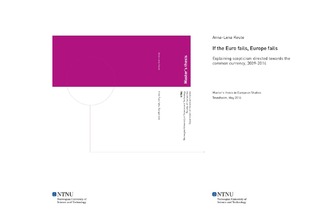| dc.contributor.advisor | Scherner, Jonas | |
| dc.contributor.author | Keute, Anna-Lena | |
| dc.date.accessioned | 2016-10-13T11:17:14Z | |
| dc.date.available | 2016-10-13T11:17:14Z | |
| dc.date.issued | 2016 | |
| dc.identifier.uri | http://hdl.handle.net/11250/2414963 | |
| dc.description.abstract | Euroscepticism is a multifaceted term capturing opposition towards various aspects of European integration. Using data from four Eurobarometer datasets, this thesis examines the development and the causes of opposition directed towards the Euro from 2009 to 2014. As the Euro crisis affects the member states of the European Union (EU) differently, the thesis applies multilevel analysis in order to explain how individual attitudes are affected by contextual variables on the macro level. For this purpose, the EU member states are divided into five clusters; core Europe, Eastern European Euro members, Southern European crisis countries, as well as Eastern and Northern European Euro outsiders. Scepticism directed towards the Euro developed differently in the five clusters and the results from five logistic multilevel regression models confirm that individual attitudes towards the Euro are affected by contextual variables. The thesis finds that Euroscepticism is a multicausal phenomenon and that differences between the clusters are related to assessments of the national economic situation. Perceptions of the national economy do not affect attitudes in the creditor states of the Eurozone. Yet, in the debtor states and in the outsider countries, support for the Euro is higher among those evaluating the situation of the national economy as bad. Hence, in the debtor nations, the Euro is perceived not as the cause of the Euro crisis, but rather as a means that will help overcome the deterioration of the economy. | nb_NO |
| dc.description.abstract | Euroskeptisisme er et mangefasettert fenomen som omfavner motstand til ulike aspekter av europeisk integrasjon. Denne masteroppgaven bruker fire datasett fra Eurobarometerundersøkelsene og analyserer utviklingen av og grunnene til skeptisisme rettet mot euroen i perioden 2009 til 2014. Ettersom eurokrisen påvirker medlemslandene i Den europeiske union (EU) på ulikt vis, bruker oppgaven flernivåanalyse for å forklare hvordan individuelle holdninger påvirkes av kontekstuelle variabler på makronivået. EU-medlemslandene deles inn i ulike klynger; kjerne-Europa, østeuropeiske euro-medlemmer, søreuropeiske kriseland, så vel som østeuropeiske og nordeuropeiske land som ikke har innført euroen. Det er forskjeller i utviklingen av motstand til euroen mellom de fem klyngene, og resultatene fra fem logistiske flernivåmodeller viser at individuelle holdninger påvirkes av kontekstuelle variabler. Oppgaven finner at euroskeptisisme er et komplekst fenomen og at forskjeller mellom klyngene er relatert til evalueringer av den nasjonale økonomiske situasjonen. Oppfatninger av den nasjonale økonomien påvirker ikke holdninger til euroen i kreditorlandene i eurosonen. I debitorlandene og i landene som ikke har innført euroen, er støtte til euroen imidlertid høyere blant de som evaluerer den nasjonale økonomiske situasjonen som dårlig. Funnene antyder at euroen ikke anses som grunnen til eurokrisen i kriselandene, men heller som et verktøy som vil hjelpe å overkomme den økonomiske nedgangen i landene som er mest rammet av krisen. | nb_NO |
| dc.language.iso | eng | nb_NO |
| dc.publisher | NTNU | nb_NO |
| dc.subject | Eurosceptisism | nb_NO |
| dc.subject | Euro crisis | nb_NO |
| dc.subject | European Union | nb_NO |
| dc.subject | multilevel analysis | nb_NO |
| dc.title | If the Euro fails, Europe fails : explaining scepticism directed towards the common currency 2009-2014 | nb_NO |
| dc.type | Master thesis | nb_NO |
| dc.subject.nsi | VDP::Social science: 200::Political science and organizational theory: 240::Comparative politics: 241 | nb_NO |
| dc.subject.nsi | VDP::Social science: 200::Political science and organizational theory: 240::International politics: 243 | nb_NO |
